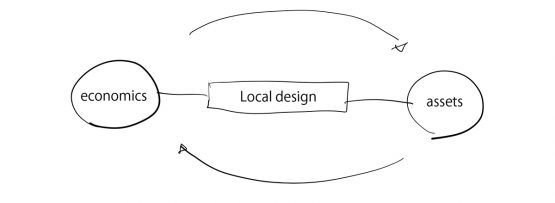This time, I would like to introduce the “Fururi” which kusukusu designed for the first time as an environmental recycling type and which the owner was satisfied with for the first time.
Fururi is a cafe in Yutenji. Unfortunately, it is closed now, but the first time I communicated with the owner was in September 2017. I was told that “I have decided the property, so I would like you to design it.” and after hearing more details, the property was decided in a hurry. After researching the store design, She thought, “Good.” Of the 5 designs, 4 were made by kusukusu. However, it was a sudden opening of a store, so there was no concept or policy. Based on the owner’s idea of “I want to create a place where people gather.” which is the only clue, we took the shape of the shop into consideration.
Kusukusu always considers branding before designing a store. Inspired by the idea of “of people, to gather” I visited the owner with a proposal that said “place to create new culture”. There are three cultures in the proposal. The first is culture that is close to everyday cafes, the second is culture related to the natural environment, and the third is culture related to food. It is about creating a culture of drinking coffee in places where there were no cafes, growing vegetables in composted garbage, and using it for cooking to create a cycle. At that time, the Australian culture of “permaculture” was taking root in Japan. The owner, who had studied in Australia, kindly agreed to allow the whole store to adopt environmentally friendly designs.
The store we actually designed had all its furnishings. There were a few things we needed, but the image was completely different, so we decided to completely renovate it. However, considering that the store is environmentally friendly, using new building materials does not fit the concept. So we decided to reuse the wood that was originally used. Our designs include furniture made from waste materials, lighting made from recycled glass, planters made from biodegradable plastic, and environmentally friendly paints made from lime.
One of the most memorable is the back wall of the kitchen. Looking at it from a distance, it looks like a normal mosaic tile, but I got a failed work from a potter in Kamakura, and we split it and pasted it together with the owner. The work was simple and hard, but it gave rise to originality, which seemed to be the starting point for conversations with customers.
Another characteristic was compost. Food waste from the cooking process was composted, the resulting fertilizer was given to the herbs planted outdoors, and the grown herbs were used to finish the Irish coffee served at the store. The waste from making coffee is used for deodorization, dehumidification, and fertilizer for plants in the store, so that circulation is created in the store as much as possible.
I think it was rare for restaurants to have such an initiative at that time. This environmentally conscious design, which kusukusu has put in as much as possible, will become standard in the future.
So what can we do better? For example, detergent. It should be basic to choose a product made from natural ingredients without surfactant. Then there’s the eco-friendly takeout cup for those who don’t have their own bottle. How about a system where you rent a stainless steel cup for deposit and use it at the store to get a discount? Even if you use FSC-certified paper cups, you end up with garbage. You can use it as many times as you want, and it may be easy for people who don’t want to carry their own bottle. It would be interesting to introduce a system that can filter water and use it many times, and one option would be to contract with a power company that generates electricity from renewable energy. Ultimately, if you install solar panels or geothermal power generation, you may be able to experience recycling more.
As time goes by, technologies and ideas for environmental recycling will be updated. It is kusukusu’s goal and my dream to become an environmentally advanced country in the world by incorporating such products and eventually building many stores with complete environmental recycling.

